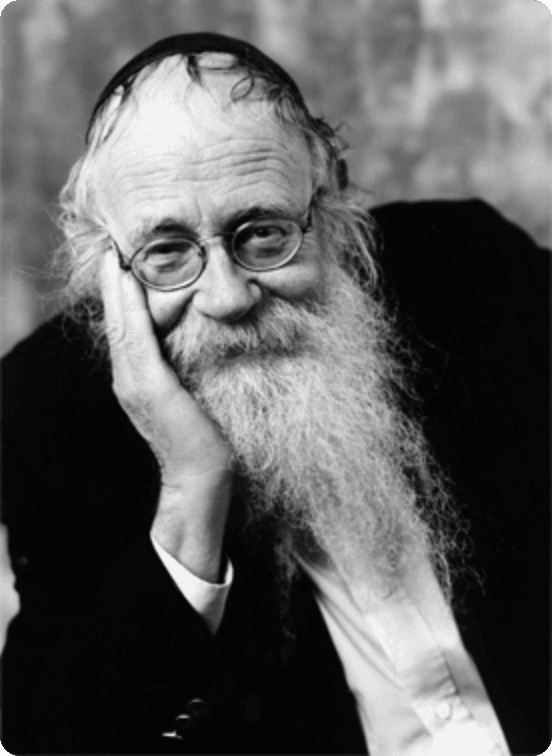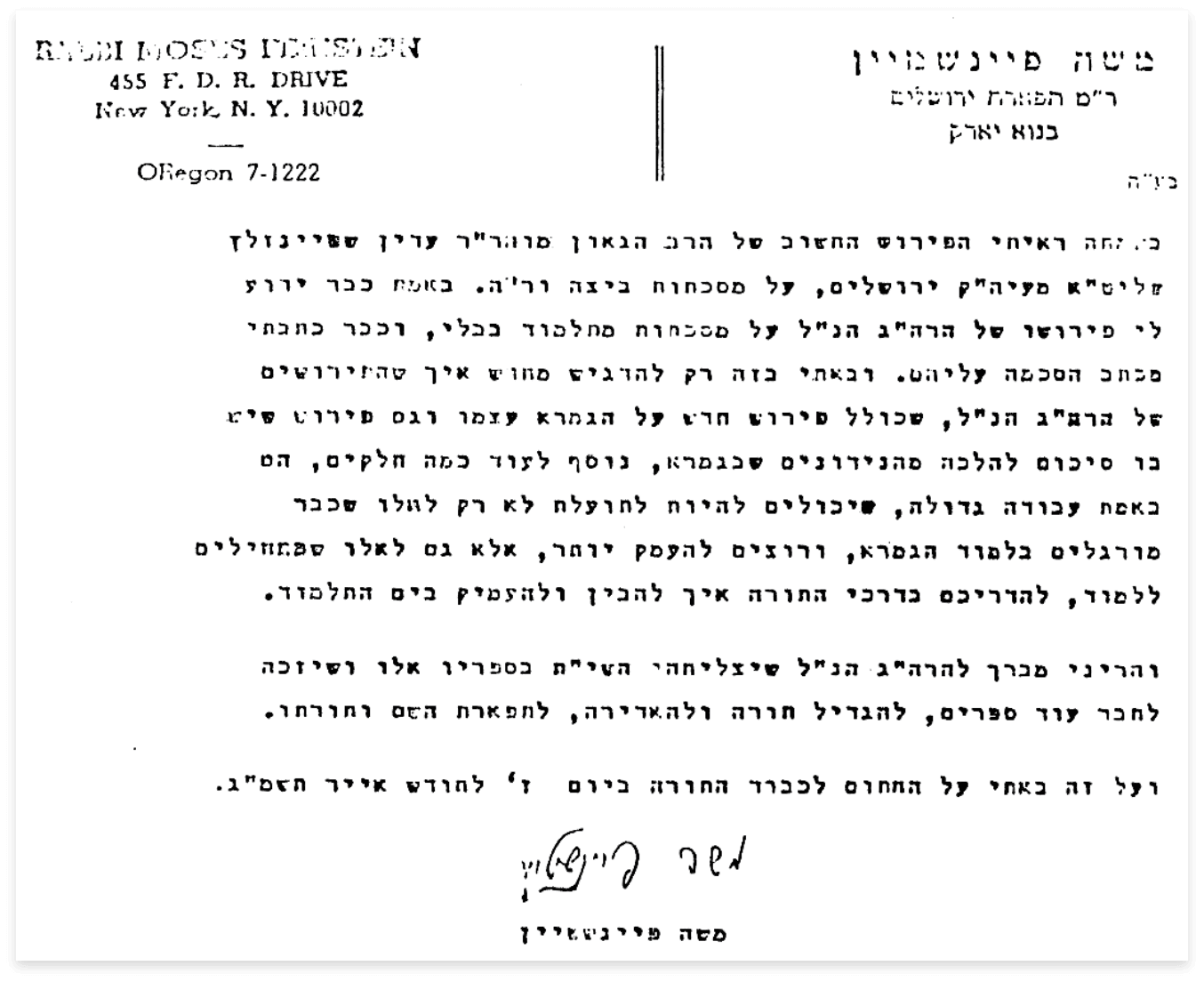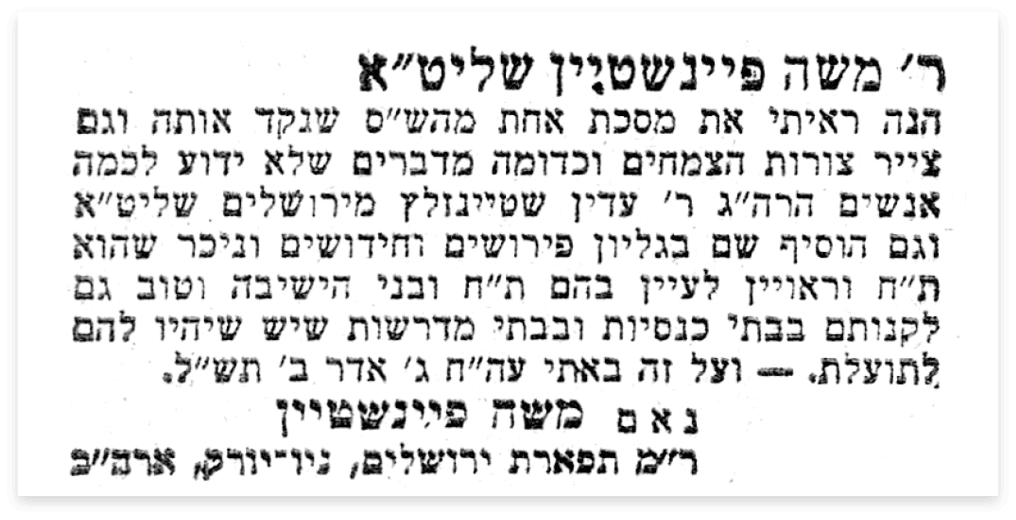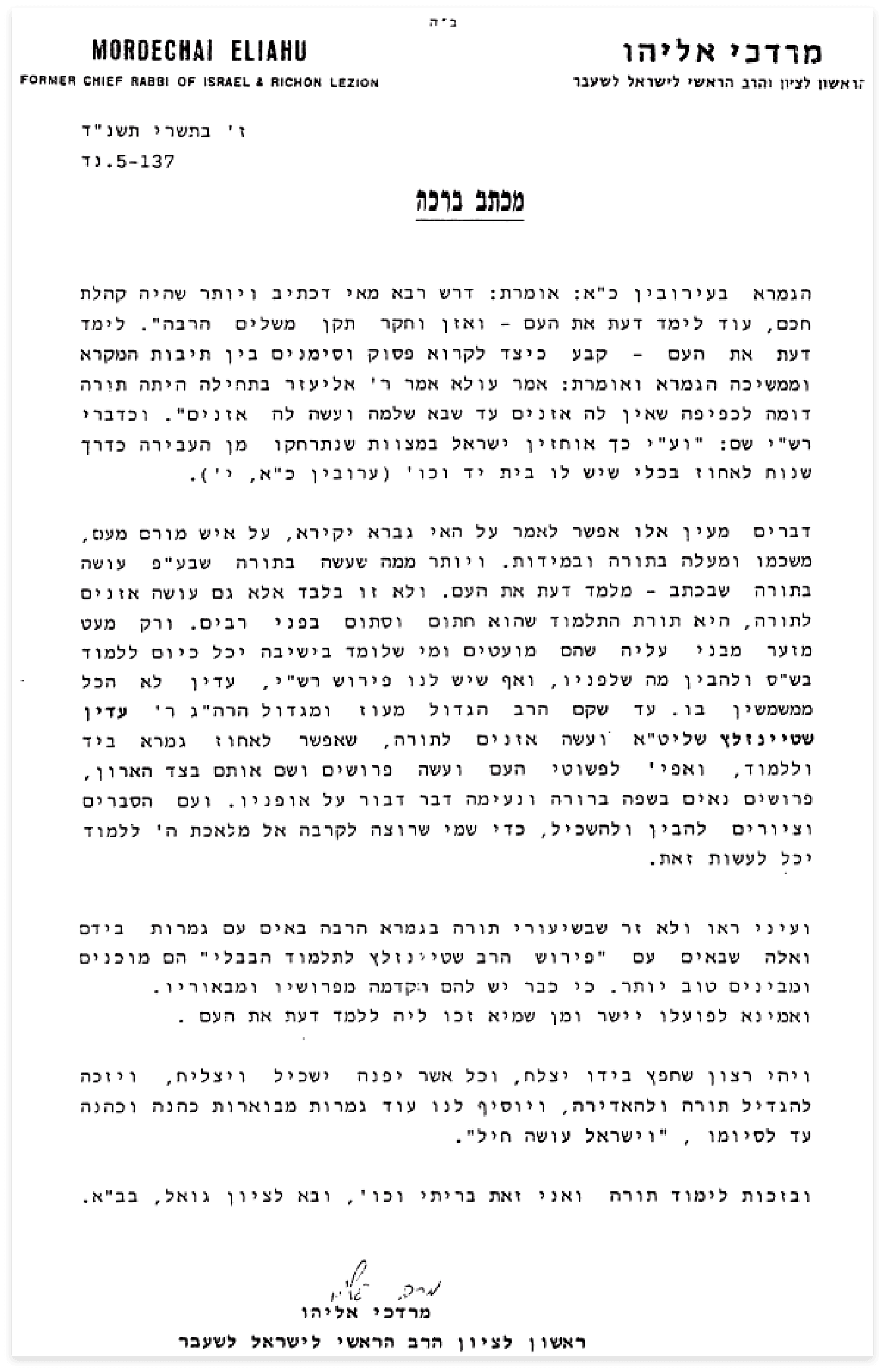About Us
About Us
Steinsaltz Center™
The Steinsaltz Center is the umbrella organization for the institutions of Rabbi Adin Even-Israel (Steinsaltz) of blessed memory.
Who We Are
The Steinsaltz Center is the umbrella organization for the ventures of Rabbi Adin Even-Israel Steinsaltz, overseeing several of the institutions and organizations that implement Rabbi's vision. In addition, the Steinsaltz Center is engaged in publishing books, establishing educational institutions, and developing educational and social initiatives in the fields of Judaism and spirituality.
History
Rabbi Adin Even-Israel Steinsaltz was a Hasidic rabbi, interpreter of the Jewish bookshelf, intellectual, educator, and author of over 300 titles in various languages. In 1964, he founded the Israeli Institute for Talmudic Publications and later began his life's work – translating the Talmud into modern Hebrew. In addition, the Rabbi established a network of educational institutions cementing his status as a unique Jewish opinion leader. Rabbi Steinsaltz won many awards, decorations, and titles in Israel and globally. The Steinsaltz Center was established in the late 70s to lead the Rabbi's extensive activities. The main goal of the Steinsaltz Center is to promote the Rabbi's vision: `"Let My People Know`"™ – making Jewish culture accessible to all.
The Center Today
The Steinsaltz Center is located in Jerusalem and coordinates the activities of the Rabbi's institutions in Israel and around the world. The Steinsaltz Center is also home to the Israeli Institute for Talmudic Publications, a research institute and book publisher based on Rabbi's Torah and thought. Since the Rabbi's passing, Rabbi Menachem (Meni) Even-Israel, leads the Steinsaltz Center's operation as CEO.
List of Major Projects:
• The Translated Babylonian Talmud – The Translated Babylonian Talmud is the flagship project of the Center. Its Hebrew publication was completed in 2010 after 45 years of work.
• The Rambam (Maimonidies) - a new edition of the 'Mishneh Torah' which includes a comprehensive commentary and several other innovations that open the gates of Rambam's philosophy to every seeker. The edition was published in September 2017.
• The Annotated Bible - an annotated edition of the twenty-four books of the Bible that includes various commentaries, prefaces, and useful aids.
• The Annotated Bible translated into English.
• The Mishnah Project- an innovative edition of the six volumes of the Mishnah, which includes commentaries, study texts, visuals, and various prefaces.
• Publication of the 'Secrets of Judaism' series in Hebrew.
• 'Secrets of Judaism' series in English (Concise Guide Series).
• Registration of "Let My People Know" and “Steinsaltz" in international copyright registration.
Current Projects :
• A series of Hassidic interpretations by Rabbi Steinsaltz, set to include ten volumes in collaboration with Maaynotecha Publishing - the first volume was published in 2022.
• Translation of Talmud commentary into French in the style of the English Talmud (set to complete in 2025).
• The Mishnah Project translated into English (set to complete in 2026).
• The Rambam translated into English (set to complete in 2026).
• The Steinsaltz Daily Study App (Hebrew and English).
• Launch of the Let My People Know Portal in August 2023.
• Project for publishing research books by Rabbi Steinsaltz - publishing one of the Rabbi's books each year in Hebrew and English.
• Students of Rabbi Steinsaltz - publishing weekly Torah study sheets and a monthly 'Shefa Rav' magazine.
• Bible translated into Portuguese.
Future Projects:
• Archive of Rabbi Adin Even-Israel Steinsaltz.
• Talmud Anthology.
• Children's Mishnah Comics.
• 'Secrets of Judaism' series in French (Concise Guide Series).
Plans and Vision
"Let My People Know..." by Rabbi Adin Even-Israel Steinsaltz.
Underlying all our plans and activities there is a vision – namely, an overall idea that connects and unifies our various activities. We prefer not to talk about it too often – both because of its dimensions, which are far beyond the grasp of one individual or even one organization, and because it cannot possible be implemented by an individual: rather, it launches a process that will influence the entire Jewish people.
In a nutshell:
Our vision is to create a Jewish renaissance. This calls for new paradigms of Jewish thought. Only inner renewal and revival can bring about a renewed momentum whereby the entire Jewish nation will operate within healthier, more stable patterns. These patterns will be the fruit of a major feat of spiritual creativity and national solidification. Rather than creating a faction or a party, our aim is to present a series of ideas and plans that will not involve compromise, patch work or an attempt to revive the near or more distant past, but will bring about a new spirit – concerning world-view, formulating goals and setting targets for the future. This activity, although it is mostly mental and spiritual, is intended to create patterns for the life of the Jewish people in general, and in the State of Israel in particular, in all areas of life. Such a large-scale course of action cannot be based upon mere declarations of intentions. Moreover, such declarations are both frightening and harmful. Therefore, we choose to make practical moves within well-defined, more limited areas, which will eventually create ever growing paradigms.
Study
Learning and creating various tools, such as books (The Steinsaltz Talmud and others), and teaching aids that will encourage and enable Jews to acquire knowledge and understanding of their original culture. The slogan is "Let My People Know", since only through learning can we attain closeness, familiarity and identification.
Experience
Stressing the place of the soul and the emotions in Jewish life. Religious Jewish life has become mechanical and technical; hence the need to deepen the study of the basic tenets of the Jewish faith – not as a mere intellectual exercise but as a complete educational course which begins at the most initial stages of education (kindergarten, or even before that age). We must introduce the elements of emotional Jewish attachment not only at the synagogue but also at the home, and not only in the religious sphere but also in the social-human sense. This is currently being done at our various educational institutions as well as through literature (Commentary to the Tanya, and other books). We wish to expand this network, as well as to help integrate its fundamental concepts in our society, its educational methods and its norms of behavior.
Leadership
Creating various tools (through the existing educational institutions and others which are being planned) in order to "produce" graduates with positive aspirations that can serve as role models for the entire people, individually or as a leading group. The orientation is an all-Jewish orientation that takes into account the needs of every Jews, wherever he or she may be, and is motivated by a sense of mutual responsibility for all the social groups and sectors within the Jewish people.
Read more...Short Biography
Rabbi Adin Even-Israel Steinsaltz is considered one of the greatest Rabbis and Jewish intellectuals of our time and the elucidator of the entire Hebrew canon (Tanakh, Mishnah, Babylonian Talmud, Rambam, and Tanya).
He was born in Israel in 1937, into a family far from religious observance, and found his way to Judaism at a young age. At 23, he became the youngest headmaster in Israel, and he headed an experimental school he established with some of his colleagues in the Negev. His main fame comes from his monumental work on the Talmud - a commentary and translation to Hebrew of the Babylonian Talmud. This edition, comprising 44 volumes, was written with a team of scholars and researchers. The Steinsaltz Talmud was also published in English and French, and a few volumes were published in Russian and Spanish. The Rabbi began this enterprise in 1965 and finished it at the end of 2010.
From 1988 onwards, Rabbi Steinsaltz established the 'Mekor Chaim' yeshiva in Moscow, the Jewish Universities in Petersburg and Moscow, a publishing house in Moscow, and "Lamed" - the National Organization of Jewish Teachers in the former Soviet Union. In 1995 he was granted the historic title of 'Duchovny Ravin' - spiritual leader - of Judaism in the former Soviet Union. As part of this role, he frequently traveled to Russia and the Commonwealth countries, where he lectured to large audiences and met with students and teachers, politicians, journalists, and key people, thereby serving as a guide for Russian-speaking Jews.
In Israel, the Rabbi established the Israeli Institute for Talmudic Publications and wrote and published more than three hundred titles and hundreds of articles on various topics: Talmud, Kabbalah, Jewish thought, sociology, historical biographies, philosophy, and more. Many of his books and articles have been translated into English, Russian, French, Portuguese, German, Swedish, Italian, Dutch, and even Georgian, Japanese, and Chinese.
In Israel, Rabbi Steinsaltz established the "Mekor Chaim" educational institution network, located in Jerusalem and its surroundings. In 1988, he won the Israel Prize for his life's work in the field of Jewish studies - the most prestigious prize awarded in the country. In 2012, he was one of the first to receive the President of the State of Israel&'s Medal of Distinction for his contribution to the country and its standing in the world. The Rabbi has been a guest lecturer and research fellow at leading academic institutions in Europe, China, and the United States, such as Oxford, Sorbonne, the Academy of Social Sciences in Beijing and Shanghai, Yale University, the University of Cape Town, and the Advanced Study Institute at the Woodrow Wilson Center.
At the end of 2016, the Rabbi suffered a severe cerebral event and as a result, lost his ability to write, and his speech was severely impaired. However, he continued to come to his office every day, to work on his books and commentaries and to comment on them. In August 2020, Rabbi Steinsaltz passed away.
Awards and Honorary Titles
1971 – Abramowitz-Zeitlin Prize for a series of articles on contemporary Judaism
1986 – Marcus Katz Award from the President of the State of Israel
1988 – Israel Prize
1991 – Honorary Doctorate from Yeshiva University
1994 – Medal of the Mayor of Paris
1995 – Honorary Doctorate from Ben-Gurion University of the Negev
1996 – Honorary Doctorate from Bar-Ilan University
1999 – Honorary Doctorate from Brandeis University
2002 – Annual Award of the Jewish Book Council in the USA for translation of the Talmud
2005 – Honorary Doctorate from the International University of Florida
2012 – Honorary Medal from the President of the State of Israel
2017 – Jerusalem Award
2019 – Honorary degree from the Weizmann Institute
2020 – The Talmud, New Edition, was introduced into the Library of Congress.
Various Roles the Rabbi Fulfilled Over The Years
From the 1960s onwards : Member of the Board of the Biblical Zoo in Jerusalem
1977 – Member of the Board of Directors of "Gesher" – for bridging the Jewish people
1980 – Member of the Committee for Planning Study Programs in the State Schools of the Ministry of Education and Culture
1982-1983 – Member of the Ethics Committee of the Israel Medical Association
1987 – – Participant in the International Forum for Spiritual and Religious Leaders at Oxford University
1989 – Chairman of the Board of Directors of the Jewish University in St. Petersburg
1995 – Spiritual leader of Judaism in the Soviet Union
1997 – Advisor at the Center for World Thanksgiving
1997-2014 – Member of the Board of Directors of the American Jewish Joint Distribution Committee
2000 – Participant in the Millennium Summit for World Peace of Religious and Spiritual Leaders, at the United Nations Center in New York
2004 – Participant in the World Symposium of Catholic Cardinals and Jewish Leaders
2016 – Member of the Marcus Katz Prize Selection Committee
Academic Roles
1976 – Research Fellow at Yale University Divinity School
1981 – Terry Lectures – lecture series at Yale University
1982 – Visiting Researcher at the Institute for Advanced Studies at Princeton University
1988 – Visiting Lecturer, Oxford University
1990 – Visiting Researcher at the Woodrow Wilson Center
1994 – Visiting Lecturer at the Sorbonne, Paris
1998 – Lecturer at the Institute for Middle Eastern Studies at Lugano University, Switzerland
1999 – Visiting Lecturer at the University of Cape Town, South Africa
2001-2005 – – Senior Research Fellow at the Center for Science and Religion Studies at Columbia University
2007 – Visiting Lecturer at Columbia University.
Various Institutions Founded by Rabbi Steinsaltz
1965 – The Israeli Institute for Talmudic Publications
1972 – Co-founder of the Pardes Institute and member of the Board of Directors
1975 – Shefa Institute
1988 – Aleph Society in New York
1989 – "Lamd" – the Organization of Jewish Teachers in the Commonwealth
1990 – The Open Jewish University in Moscow
1994 – The Institute for Training Jewish Leadership in the Commonwealth
1999 – Mekor Chaim High Yeshiva, Tekoa
2004 – The Hesder Yeshiva in Tekoa
2006 – Melamedia – The Center for Jewish Family Life, in the Commonwealth and in Israel
2007 – Middle and High School "Shefa" for Boys
2009 – Intermediate School "Shefa" for Girls
2016 – The "Kollel" High School for Jewish Law at the Yeshiva of Tekoa
2017 – The Pedagogical Center for Writing Study Programs.
Various Activities at the Steinsaltz Center
2010 – to date – Global Jewish Study Day, at the beginning of November each year
2010-2017 – 'My Favorite Sugya' - A weekly lecture series on issues in the Gemara, with a variety of renowned personas and lecturers
2015 – Foundation of the 'Truth and Justice' Court
2016 – Foundation of a conversion institute in Marseille, France, partly managed from the Steinsaltz Center offices in Jerusalem
2017 Establishment of the "Friday Study Hall"
2021 Establishment of a pedagogical center for the production of study materials and guidance.
Rabbi Menachem Mendel Schneerson
“…I have just had the pleasant surprise of receiving tractate Shabbat (part one), which has been published by [Rabbi Steinsaltz] along with his explanations, etc. Happy is the man who sees good fruits from his labors. May he continue in this path and increase light, for in the matters of holiness there is always room to add – and we have been commanded to add – for they are linked to the Holy One, Blessed be He, Who is infinite. And may the Holy One grant him success to improve and enhance this work, since the greater good strengthens his hand…”
Rabbi Menachem Mendel Schneerson, The Lubavitcher Rebbe. Brooklyn, 5 Marĥeshvan 5729Rabbi Moshe Feinstein
“…These new commentaries – which include a new interpretation of the Talmud, a halakhic summary of the debated issues, and various other sections – are a truly out-standing work; they can be of great benefit not only to those familiar with talmudic study who seek to deepen their understanding, but also to those who are just begin-ning to learn, guiding them through the pathways of the Torah and teaching them how to delve into the sea of the Talmud. I would like to offer my blessing to this learned scholar. May the Holy One grant him success with these volumes and may he merit to write many more, to enhance the greatness of Torah, and bring glory to God and His word…”
Rabbi Moshe Feinstein New York, 7 Adar 5743“I have seen one tractate from the Talmud to which the great scholar Rabbi Adin Steinsaltz שליט״א has added nikkud (vowels) and illustrations to explain that which is unknown to many people; he has also added interpretations and innovations, and is evidently a talmid ĥakham. Talmidei ĥakhamim and yeshiva students ought to study these volumes, and synagogues and batei midrash would do well to purchase them, as they may find them useful.”
Rabbi Moshe Feinstein New York, Adar 5730Rabbi Mordechai Eliyahu
“The Talmud in Eruvin 21b states: Rava continued to interpret verses homiletically. What is the meaning of the verse: “And besides being wise, Kohelet also taught the people knowledge; and he weighed, and sought out, and set in order many proverbs” (Ecclesiastes 12:9)? He explains: He taught the people knowledge; he taught it with the accentuation marks in the Torah, and explained each matter by means of another matter similar to it. And he weighed [izen], and sought out, and set in order many proverbs; Ulla said that Rabbi Eliezer said: At first the Torah was like a basket without handles [oznayim] until Solomon came and made handles for it. And as Rashi there explains: And thus were Israel able to grasp the mitzvot and distance themselves from transgressions – just as a vessel with handles is easily held, etc. Such things may be said of this beloved and eminent man, a great sage of Torah and of virtue. And far more than he has done with the Oral Torah, he does with the Written Torah – teaching the people knowledge. And beyond that, he also affixes handles to the Torah, i.e., to the Talmud, which is obscure and difficult for many. Only the intellectual elite, which are a precious few, and those who study in yeshiva, can today learn the Talmud and understand what it says – and even though we have Rashi, still not everyone uses him. But now the great scholar Rabbi Adin Steinsaltz שליט״א has come and affixed handles to the Torah, allowing the Talmud to be held and studied, even by simple men. And he has composed a commentary alongside the text, a fine commentary in clear, comprehensible language, “a word fitly spoken” with explanations and illustrations, so that all those who seek to study the work of God can do so.”
Rabbi Mordechai EliyahuRabbi Moshe Zvi Neria
“The translation of the books of our past into the language of the present – this was the task of the sages of every generation. And in Israel, where the command to “teach them repeatedly to your children” applies to all parts of the nation, it was certainly the task of every era. This is true for every generation, and in our time – when many of those who have strayed far are once again drawing near – all the more so. For many today say, “Who will let us drink from the well” of Talmud, and few are those who offer up the waters to drink. We must, therefore, particularly commend the blessed endeavor of Rabbi Adin Steinsaltz to explain the chapters of the Talmud in this extensive yet succinct commentary, which, in addition to its literal interpretation of the text, also explicates the latter’s underlying logic and translates it into the language of our generation. It appears that all those who seek to study Talmud – the diligent student and the learned adult – will have no difficulty understanding when using this commentary. Moreover, we may hope that the logical explanation will reveal to them the beauty of the talmudic page, and they will be drawn deeper and deeper into the intellectual pursuit which has engaged the best Jewish minds, and which serves as the cornerstone of our very lives…”
Rabbi Moshe Zvi Neria






